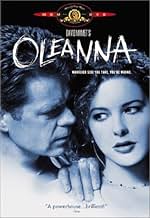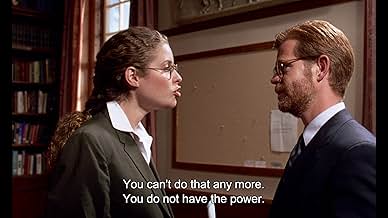IMDb RATING
6.5/10
3.8K
YOUR RATING
When a student visits her professor to discuss how she failed his course, the discussion takes an awkward turn.When a student visits her professor to discuss how she failed his course, the discussion takes an awkward turn.When a student visits her professor to discuss how she failed his course, the discussion takes an awkward turn.
- Awards
- 1 nomination total
Diego Pineda
- Quarterback
- (uncredited)
Scott Zigler
- Clerk in Copy Shop
- (uncredited)
Featured reviews
Student Carol (Debra Eisenstadt) visits Professor John (William H. Macy) to discuss how she failed his course but the discussion takes an awkward turn.
Roger Ebert, who loved the play, was "astonished" to report that Oleanna was not a very good film, characterizing it as awkward and lacking in "fire and passion". He does think the play 9and to some extent the film) makes clear how men and women can see things two different ways. He freely admits he sides with the male point of view while others have argued that the student was in the right.
Overall, I did not really care for the movie. I like Mamet and I love his dense writing, but it seemed to fall flat here. Macy is alright, but the student is annoying. She comes across as either stupid or in some way stunted. The repetition is annoying, too, as how many times must she ask about his house?
Roger Ebert, who loved the play, was "astonished" to report that Oleanna was not a very good film, characterizing it as awkward and lacking in "fire and passion". He does think the play 9and to some extent the film) makes clear how men and women can see things two different ways. He freely admits he sides with the male point of view while others have argued that the student was in the right.
Overall, I did not really care for the movie. I like Mamet and I love his dense writing, but it seemed to fall flat here. Macy is alright, but the student is annoying. She comes across as either stupid or in some way stunted. The repetition is annoying, too, as how many times must she ask about his house?
The dialogue is difficult to get past -- you want to grab the characters one at a time by the throat so the other one can at least finish a sentence or thought without interruption. But if you stick with it, the characters do deliver on what had to be a difficult script. And I found the irony of the story line to be the reward. It is a mind game -- not for the casual viewer.
One general misunderstanding (in my opinion) of Mamet is that he tries to write realistic dialog. In Oleanna, Mamet seems to want to speak directly through each character in a very academic verse which is well suited to the film/play. The issues of sexual misconduct and the way perspectives differ between men and women make this an interesting journey. And if you are a Bill Macy fan, you will like the movie.
10oowawa
One writer perceptively suggests that the term "Oleanna" was used to describe swampland being sold as prime real estate.
I think the primary context in which the title "Oleanna" is to be understood appears in a "folk" stanza preceding Mamet's published edition of the play:
"Oh to be in 'Oleanna,'/ That's where I would rather be,/ Than be bound in Norway/ And drag the chains of slavery."
And so, Oleanna is a version of a Utopian promised land, and in the context of the play, the gateway to this better tomorrow is through the halls of Academia. Susan, the victim of her own false expectations of how the university is to transform her existence, repeatedly mentions the struggle she had to endure in order to get into college. For her, academic success is central to her vision of a better life. John, the pedantic professor, also sees Academia as the means to a comfortable, upper middle class existence with his new house, wife, and son. All he needs to do is make tenure, and his future is secured.
However, John presents himself as an academic bad-boy who debunks the very Academia with which he is trying to secure his comfortable future. This ridicule of the academic process strikes at the heart of Carol's dreams of a better future through education. She quite rightly sees that the professor is trying to have it both ways--playing the academic outsider while trying to kiss-up to the tenure committee in order to ensure his cushy new home in the suburbs. When someone's dreams are threatened, they become angry and strike out, however they can.
This is a brilliant movie. Anyone working in a high school or university, and anyone contemplating an academic career, needs to watch it, and allow it to soak deep into the structure of the brain. Perhaps that academic career isn't such a good idea, after all. Maybe that utopian real estate is really swampland. At any rate, one needs to be very, very careful when dealing with students.
I think the primary context in which the title "Oleanna" is to be understood appears in a "folk" stanza preceding Mamet's published edition of the play:
"Oh to be in 'Oleanna,'/ That's where I would rather be,/ Than be bound in Norway/ And drag the chains of slavery."
And so, Oleanna is a version of a Utopian promised land, and in the context of the play, the gateway to this better tomorrow is through the halls of Academia. Susan, the victim of her own false expectations of how the university is to transform her existence, repeatedly mentions the struggle she had to endure in order to get into college. For her, academic success is central to her vision of a better life. John, the pedantic professor, also sees Academia as the means to a comfortable, upper middle class existence with his new house, wife, and son. All he needs to do is make tenure, and his future is secured.
However, John presents himself as an academic bad-boy who debunks the very Academia with which he is trying to secure his comfortable future. This ridicule of the academic process strikes at the heart of Carol's dreams of a better future through education. She quite rightly sees that the professor is trying to have it both ways--playing the academic outsider while trying to kiss-up to the tenure committee in order to ensure his cushy new home in the suburbs. When someone's dreams are threatened, they become angry and strike out, however they can.
This is a brilliant movie. Anyone working in a high school or university, and anyone contemplating an academic career, needs to watch it, and allow it to soak deep into the structure of the brain. Perhaps that academic career isn't such a good idea, after all. Maybe that utopian real estate is really swampland. At any rate, one needs to be very, very careful when dealing with students.
The tag line of this movie is that "whichever side you take, you're wrong," is itself wrong. There clearly is a wrong and right side. If we were to sit Catherine McKinnon and Andrea Dworkin down and show them only the first half of the movie, even they would be pressed to find any sexual harassment (let alone rape). We would find a self-absorbed professor, and knifing student (whose clipped speech, and apparent dumbfoundedness is belied later when she fabricates, embellishes, and spins the truth for her PC ends). If being self-absorbed is enough to get one fired and falsely accused of rape, then Mamet's lesson must be that the feminist orthodoxy has gone too far.
Did you know
- TriviaDavid Mamet's script was heavily criticized as sexist. He defended himself against this allegation in (Guardian supplement) (UK) 8 April 2004, pg. 8-9, "'Why can't I show a woman telling lies?'"
- GoofsWhen Carol leaves John's office after their second meeting, shouting "Help!", the shadow of the camera covers the door.
- Alternate versionsThere is a version of the movie circulating in Australia, in a series of videos along with other David Mamet films including "A Life in the Theater". This particular copy of the film is timecoded. In that version, after Carol tells John not to call his wife "baby," (thus sending him into a torrent of rage), and he slaps her arm and grabs her, screaming a sexual expletive and raising a chair above her head, the door to the hallway swings open and a number of people stand in the hallway, observing the fight and thus hopelessly damning John. In the version now appearing on The Sundance Channel (10/05), the expletive is unchanged but he never lifts the chair and the door never opens; aside from a final exterior shot of the school, the film ends with Carol (Eisenstadt) having collapsed on the floor of John's office, and John sitting in his chair, his head buried in his hands.
- SoundtracksLong Ago And Far Away
Words by David Mamet
Music by Rebecca Pidgeon
Soloist: Steve Goldstein (as Steven Goldstein)
© Copyright 1994 Dwight Street Music
- How long is Oleanna?Powered by Alexa
Details
- Release date
- Countries of origin
- Official sites
- Language
- Also known as
- David Mamet's Oleanna
- Filming locations
- Production companies
- See more company credits at IMDbPro
Box office
- Gross US & Canada
- $124,693
- Opening weekend US & Canada
- $25,316
- Nov 6, 1994
- Gross worldwide
- $124,693
Contribute to this page
Suggest an edit or add missing content























